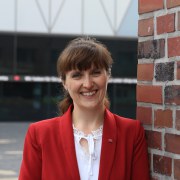Climate and biodiversity: from Blah Blah Blah to Impact
Research, theory & evaluation
Can alternatives to traditional messaging be more motivating or reach audiences who feel unable or unwilling to take action for sustainability? And what can we learn from sources outside the museological and visitor studies literature?
The climate and biodiversity crises need urgent action. Yet, many feel overwhelmed by the scale of the problems. They feel that any action they may take is drowned out by the inaction of others, or they are not aware of all the possibilities for action that actually exist. The result is all too well known—despite decades of science communication about these topics, the planet is in the middle of a sixth mass extinction and devastating climate change.
In this session, speakers will share examples of how alternative communication may encourage more people to take a broader scope of actions, and how evidence-based strategies from social psychology can aid informal science education in targeting these crucial topics.
This session is part of the Biodiversity and climate crisis conference track.
Outcomes: what will participants get from this session? Skills, knowledge, experience etc.
Participants will come away with recommendations for how to expand and improve their biodiversity and climate communication. They will be inspired by examples of how the right communication channels can reach more people, how a broader and more optimistic messaging can be motivating for action, as well as how to practically approach and draw on the wealth of extremely relevant advice that informal-science practitioners can glean from social-psychology literature.
Facilitator
Head of Global Engagement
Session speakers
We at experimenta have developed different formats with the main goal of encouraging visitors to participate and reflect upon their own actions. In our forum, for example, citizen science is a focus topic. Other formats that we offer are whole-day engagement programes on sustainability in various learning environments – either for one or many classes at the same time. In this session, we present approaches and share our experiences.
Program coordinator for STEM education at experimenta - the Science Center
experimenta - Das Science Center
Franziska will be presenting together with Viola.
Exhibition Developer, Audience Research
At the Natural History Museum of Denmark, we did a survey with messaging on how renewable energy has become price competitive to fossil energy, and suggested actions for individuals to influence the systemic transition to renewable energy (e.g. by greening their pension funds). I’ll be discussing the influence this kind of messaging had on behavioral intentions for both lifestyle changes and systemic actions.
Associate Director Exhibit Content Development
San Francisco
United States
Does it matter that a climate exhibit is accurate if visitors come away not understanding the science or how their choices have an impact? Social psychology research on understanding new concepts and decision-making are acutely relevant. Using objective techniques to test wording and imagery is invaluable to create more comprehensible and memorable informal science learning experiences. I will review several lines of academic research in science communication that can be used for more effective engagement of visitors with climate change science.





